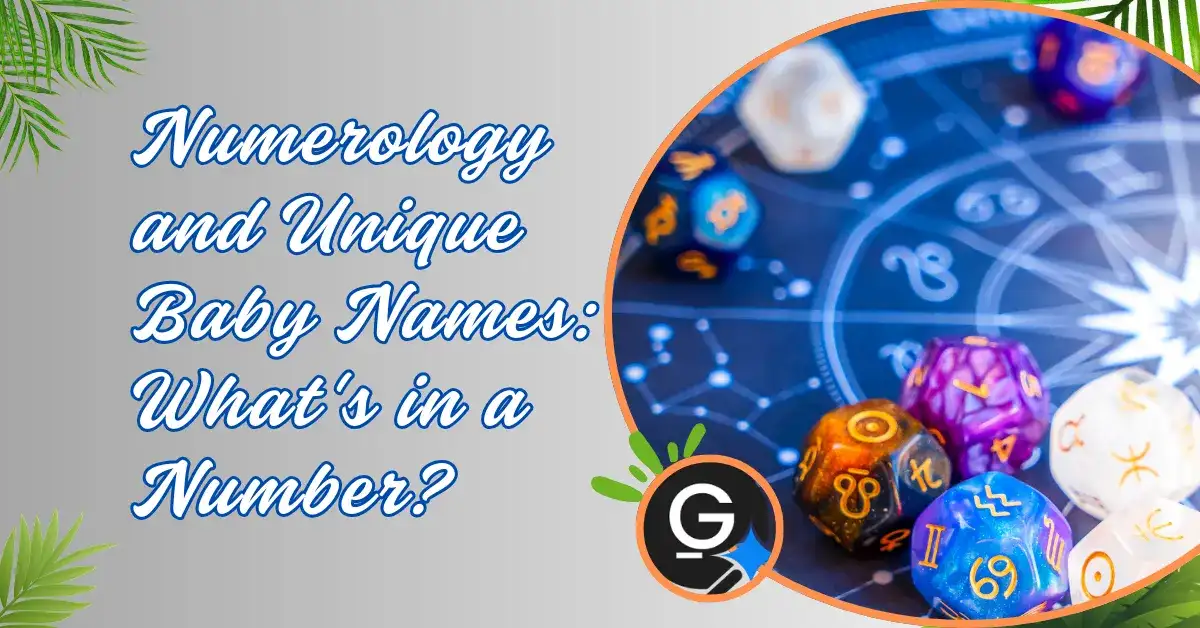In the modern world, in every walk of life, everything is turning smart and unique day by day. And the 'Name of Individuals' is not an exception. It has been said that "To an individual, his/her name is the most beautiful word". We want to hear our name most often. Hence choosing a unique name is a matter of great concern.
If you are soon to become a parent or recently gave birth to a kid, you are in the best position to choose a unique baby name for your child. Give your child a name in which they may take pride. Specialize it. Here are some reasons that strongly urge you to choose the most unique baby names for your young ones.
Short Story to Show the Importance of Unique Baby Name
Due to the distinctive and significant meaning of the name, Seraphinaâs parents decided to name her Seraphina. The Hebrew name Seraphina means "fiery ones" or "burning ones." It's a name that suggests strength, intensity, and a clear sense of purpose. They were unaware of the remarkable ways in which Seraphina's identity would be determined by this nickname.
Growing up, Seraphina learned that her unique name drew attention wherever she went. Teachers, pupils, and friends were curious about the name's meaning and its connection to angels in many religious traditions. She found satisfaction in it, and it was brought up in conversation.
The significance of Seraphina's name was emphasized by her parents, and they encouraged her to live life with a fiery spirit. They thought the name of their daughter was predestined.
Seraphina distinguished herself from her classmates and teachers in school due to her unique name. They associated her with the fire associations of her name and saw her as a confident and driven individual. Seraphina succeeded in her studies and extracurricular activities after adopting this identity.
When it came time to fill out college and scholarship applications, Seraphina's name was still beneficial. The scholarship committees and admissions personnel frequently recalled her application due to her unique name. It helped her stand out from the application pool in a positive way.
Seraphina decided on a career in advocacy as an adult and devoted her life to topics that were important to her. Her unique name came to symbolize her determination and steadfast commitment to improving the world. She frequently poked fun at the fact that her nickname was a constant reminder to stay motivated in her work.
In both social and professional contexts, the word "Seraphina" kept coming up. Because she embodied courage and persistence, her coworkers looked up to her. Friends admired her for her positive outlook and enthusiasm for life. Seraphina came to understand that throughout it all, her distinctive name had not only helped others recognize who she was but had also inspired her.
The impact of having a distinctive name is evident in Seraphina's life. It can provide people motivation, a feeling of direction, and a constant prompt to live up to its significance. She demonstrates how a person's name may significantly affect and shape their life. It has helped her have a huge impact on the world.
Attractiveness of Unique Baby Names
For the number of reasons that are described below, many parents prefer unique baby names.
Individuality and Uniqueness: Because they want their child to have a unique identity, many parents are drawn to unique baby names. Children with distinctive names stand out in a crowd of people with similar names and can make a statement.
Standing Out in a Crowd: Individual names have the potential to draw attention. They frequently pique curiosity and might leave a lasting impact. Parents who select unusual names could hope for their children to leave a lasting impression.
Creative Expression: For some parents, coming up with an original name is an act of creativity. They can express their creativity and individual viewpoints while reflecting on their dreams and objectives for their child.
Avoiding Stereotypes: If children have rare names, they may be better able to avoid the stereotypes or preconceived notions associated with more common names. They could get a second opportunity and build their reputation and character as a result.
Open-Mindedness: Giving a child a name that sticks out could help to foster their open-mindedness because it tells them at a young age that there is no one "correct" way to name someone. It might encourage esteem and understanding of various naming practices.
Below, you will find some examples of unique baby names. These names might help you decide unique names for your child.
Aurelia: In Latin, the name Aurelia means "golden" or "gilded," conjuring up ideas of grace and beauty.
Kairos: This unusual word, which is Greek in origin, signifies "the right moment." For parents who believe in destiny, choosing this name could prove to be a crucial decision.
Ezra: This name has Hebrew ancestry. It denotes "help" or "assistance". This name has become very popular recently.
Zephyr: The word Zephyr means "west wind." This name conveys a sense of subdued ease.
Seraphina: The name Seraphina, which means "fiery ones" or "burning ones," is also of Hebrew origin. This name conveys vigor and power.
Sylvan: This name has a Latin etymology. It denotes being "of the forest" or "wooded." This name suggests a bond with the natural world.
Elowen: This name derives from Cornish and means "elm tree." Nature enthusiasts will connect with this name.
Zenith: Zenith refers to a peak or the highest point. This may be an original decision that suggests ambition.
Merits of Having Unique Baby Names
Memorable and Differentiable: Being memorable and distinctive is one of the main benefits of choosing a unique baby name. Unique names stand out in people's memories in contrast to common or often-used names. In social and professional settings, they provide a lasting impact that makes it simpler for people to be recognized and remembered throughout their lives.
Less Confusion: Particularly in contexts like school or the workplace, unique names frequently have fewer namesakes, which reduces the possibility of confusion. Conversations might flow more easily as a result, and there might be fewer instances of administrative bafflement, such as when there are multiple people with the same name in a group or workplace.
Enhanced Self-Esteem: Children who grow up with an unusual name may feel more unique and individual, which may have a beneficial effect on their self-esteem. As a result of feeling unique and proud of their name, their self-esteem and confidence may rise. Children with unique names are more inclined to embrace their own identities and value their differences.
Enhanced Online Presence: In the internet era, having a distinctive name can help people create a strong online identity. A more distinctive and memorable digital footprint is possible because unique names are less likely to already be in use as usernames or domain names.
Personal or Symbolic Meaning: Unique names frequently have very personal or symbolic meanings that were chosen by the parents. The infant may develop a strong emotional bond with their name as a result, giving it meaning beyond simple identification.
Conversation Starter: Unique names can be used as conversation starters throughout a person's life. A distinct more personal level whether they are meeting new people, going on job interviews, or forming social relationships.
Cultural Significance: Unique names frequently have cultural or historical importance, which helps the child feel more deeply connected to their background. As a result, they may feel more connected to their roots and develop a feeling of cultural awareness.
Cultural Consideration While Naming BabiesÂ
Cultural Differences: Distinct cultures and geographical areas have quite distinct naming conventions and traditions. Parents must take into account their cultural heritage as well as the cultural connotations of names. For instance, in certain societies, certain names may have great religious or historical importance.
Several families have enduring naming customs that have been handed down through the generations. These customs may involve giving children names that have special connotations, naming children after grandparents, or adhering to cultural naming rituals. Examining and observing these customs can be an important part of naming a child.
Global Awareness: In today's interconnected society, parents frequently come from different origins or may live abroad. A blending of cultural elements may result from this. Since a child's name can affect their experiences and interactions throughout their life, think about how it might be seen and understood from a global perspective.
Despite the numerous advantages and benefits of having unique baby names, there exist some challenges that need to be addressed. Let us first look at the challenges of unique baby names.
Challenges or Problems with Unique Baby Names
Problems of Spelling and pronunciation: Unusual spellings or pronunciations are common with unique names. This may result in repeated corrections and justifications throughout a person's life. Parents should think about potential pronunciation and spelling errors in their child's name and whether they feel comfortable addressing these issues.
Social and cultural factors should be taken into account: Uncommon names may arouse intrigue or queries, and occasionally even prejudice or stereotypes. Parents need to be aware of any biases or judgments that their children might experience just because of their names. In civilizations that are diverse and multicultural, this concern becomes essential.
Misunderstanding and Teasing: Children can be sensitive to teasing or feeling different from their peers, which can lead to misunderstandings or potential teasing. Children with unusual names may be more vulnerable to teasing, though this primarily relies on the name in question and the social setting.
Legal Restrictions: Unusual names may not always adhere to naming conventions, which could provide problems when applying for passports or licenses, among other official documents. To prevent potential legal issues, parents should be aware of their community's name regulations.
Nevertheless, here are some tips on how to overcome these challenges while still choosing the best unique name for your baby.
Simple is Best: Pick a name that stands out yet is also simple to spell and pronounce. This can lessen the possibility of misunderstandings and mispronunciations.
Education and explanation: Encourage your youngster to take pride in their distinctive name and provide them background information on its meaning. They can confidently respond to inquiries or interest from others thanks to this.
Respect Individuality: Teach your child to respect others' differences and uniqueness. Help them understand that being known by a unique name is a valuable part of who they are and should be appreciated.
Cultural sensitivity: Let others know the significance of any cultural connotations the name may have. This might encourage respect and comprehension between people.
Legal Verification: Verify that the name you've picked complies with all relevant regulations and legislation. When obtaining formal documentation in the future, can help prevent any legal difficulties.
Examine Nicknames: Consider whether the name can be quickly abbreviated into a more popular nickname. The ability to use a nickname might give you flexibility in a variety of social settings.
Encouraging Environment: Create a welcoming atmosphere in your family where your child will feel at ease talking about any difficulties or experiences they may be having because of their unusual name.
Neighborhood and role models: Introduce your youngster to admirable role models that have a similar name to theirs or have overcome comparable obstacles. This encourages self-assurance and fortitude.
Respond to Teasing: Provide your child with techniques for handling teasing or critical remarks in a positive way, such as talking to a reliable adult or using humor to defuse tense situations.
Celebrate Individuality: Encourage your youngster to accept their special name as a part of who they are. Celebrate their name on their birthdays and other special occasions to emphasize its importance.
Practical Tips or Guide to Choosing Unique Baby Names
Researching names and brainstorming ideas: Encourage parents to start by thinking of names that speak to them. Look up the origins, connotations, and cultural significance of proposed names. Baby name applications, websites, and books can all be useful sources of inspiration.
Considering Future Aspects: Encourage parents to consider how the chosen name might match their kid throughout different life phases, from infancy through adulthood. Make sure the name can be used in a variety of settings and contexts.
Getting Advice from Family and Friends: Encourage parents to get advice from dependable family and friends. They may provide insightful or helpful suggestions, as well as a feeling of how the name will be accepted by close relatives.
Think About Compatibility: Consider how the last name and the name you've picked go together. While certain combinations could be easy to speak and flow naturally, others might be difficult or result in unexpected wordplay.
Verify Initials: Pay attention to the initials that will make up the baby's name. Make sure they don't accidentally or maybe embarrassingly spell out anything.
Say It Out Loud: To obtain a sense of how the name sounds in real-world contexts, practice saying the name out loud as well as yelling it. This might assist you in figuring out whether the name is simple to say and has a pleasing sound.
Consider Nicknames: Consider potential nicknames that might be given to the name you have chosen. Certain nicknames that some names naturally give themselves to may be cute or unattractive.
Think About Popularity Trends: Find out how popular the name has been lately. Some parents want names that are neither overly popular nor incredibly uncommon. To find out where a name stands, you can look into baby name trends and rankings.
Trust Your Instincts: In the end, trust your intuition and pick a name that both you and your partner will like. The name of your child should be something you both adore and identify with.
Resources That Might Help You Find Unique Baby Names
Books on Baby Names: Suggest well-liked books on baby names that include exhaustive listings of names along with their origins and meanings. Some books concentrate solely on unusual or uncommon names.
Online Name Databases: Direct parents to websites and online databases for baby names, which frequently have search filters for unusual or uncommon names. These platforms can offer a lot of ideas and possibilities.
Use of Name Generator: Mention the existence of applications or name generators for babies that can assist in generating original name suggestions based on particular parameters, such as cultural background or name length.
References from Culture and History: Encourage parents to research their cultural history and take into account names that have historical or familial importance. This may prompt unusual and significant decisions.
Literature & Poetry: For creative and poetic name suggestions, look into literature, poetry, and even song lyrics. Character names that stand out are frequently created by authors and might be an inspiration. Novels from the present day and classic literature can both be excellent sources.
Mythology and Folklore: Explore the fascinating realm of mythology and folklore from many cultural perspectives. Numerous legendary names are distinctive and have intriguing origins and connotations. You may find a wealth of unique names in mythology, whether it be Greek, Norse, African, or any other.
Nature and art: The realms of nature and art can be a fantastic source of original names. Think of artist or painter names or natural phenomena like flowers, constellations, or geological aspects. These names frequently have beautiful symbolism.
Family history: Research the ancestry and names of your family. You can come across unusual names that have personal significance for you and your child in your family history.
Maintaining a Balance between Uniqueness and Tradition
Parents frequently struggle to strike the right balance between giving their children a unique name and respecting the naming customs of their relatives or the larger community. This balancing act entails considering cultural norms, family expectations, and personal preferences, which poses considerable decision-making difficulty.
There are several reasons why a name might be appealing and unusual. Many parents want to give their children a name that is distinctive and reflects their uniqueness. A child that has a unique name may feel proud, unique, and different from everyone else. The hunt for odd or distinctive names that appeal to the parents can also be considered a creative outlet for them.
On the other hand, tradition and family expectations are important factors in naming for many people. Many cultures have strong customs surrounding naming children, and names are frequently passed down through the centuries. This practice can provide a sense of heritage and continuation by preserving family history and traditions. The weight of familial expectations can make it challenging to choose a name that deviates too much from recognized norms.
How Parents Can Maintain a Balance Between Unique Baby Names and Their Traditions?
First, parents need to have an open and sincere discussion between family members. Discussing name options and expectations with one another and with extended family members can help to clarify priorities and potential challenges. This conversation can help parents comprehend why some names are significant to their families and pave the way for original or cooperative ideas.
A compromise can also be reached using the middle name. Many parents opt to give their child a unique first name while choosing a more traditional family name for the child's middle name. This approach combines the best of both worlds with a distinctive first name and a middle name that respects family history.
Examining variations on classic names is another tactic. Parents can discover original variations on traditional names that blend tradition's familiarity with a modern, individual vibe. Both the need for individuality and the respect for cherished family traditions can be met by this strategy.
Take into account the possibility of a nickname as well. If the preferred name is unusual and can be difficult for others to pronounce or recall, a more popular or quickly shortened nickname can offer a workable option. In this approach, the child might have a distinctive full name while still having the choice to choose a conventional nickname in casual settings.
Do some additional study on the names that have been used in your family, both historically and culturally. The importance of a traditional name choice and the connection to family history can be increased by being aware of these names' origins. The choice should ultimately represent the parents' values, preferences, and cultural context. It could be difficult to win everyone over, but it's crucial to pick a name that sounds good to both the child and the parents.
Balancing uniqueness and tradition when choosing a baby name is a deeply personal and often challenging process. It involves navigating family expectations, personal preferences, and cultural influences. Through open communication, compromise, and thoughtful exploration of options, parents can find a name that strikes the right balance, honoring tradition while embracing the uniqueness of their child. Ultimately, the chosen name should be a source of pride, identity, and connection for both the child and their family.
Things You Need to Know While Choosing a Unique Baby Name
Choosing a distinctive baby name can be a critical choice in a world where names are the first identities we carry from birth to the end of our journey.
The opportunity to recognize creativity and put a child on the road to self-awareness and empowerment is provided by unique baby names. Their names are meaningful and ring true, whether they derive from ancestry, cultural importance, or personal experiences. In a sea of similarities, these names stand out and have an immediate impression, showcasing a person's unique individuality.
Additionally, original names can stimulate imagination and a sense of direction. They encourage kids to explore their potential and embrace their passions by igniting their curiosity and zeal for life. A distinctive name can inspire pride and inspire people to live up to the power and symbolism it represents.
Unique names can be useful in a world that is becoming more and more digital. They help people develop a distinctive online presence, which makes it simpler for people to stand out in a crowded field. They are memorable, frequently leaving a lasting impression on people's thoughts, and increase a person's recognizability in a variety of contexts.
But while choosing a novel name, there are additional things to consider. There can be concerns with the name's pronunciation, spelling, and need for a history explanation. Parents must prepare their kids for these challenges and show them how to triumph over them politely.
Furthermore, it can be challenging to strike the ideal balance between uniqueness and tradition. Unique names highlight individuality, although it is impossible to fully disregard tradition and familial expectations. Finding a midway ground where a name represents both personality and cultural past requires considerable discussion and compromise.
Conclusion
Finally, distinctive baby names are more than just labels; they are potent representations of identity, creativity, and inspiration. They have the capacity for greatness and the weight of purpose. The story of Seraphina, which was previously discussed, shows how a special name may influence a person's life by serving as a continual reminder of their fire spirit and steadfast dedication to their goals.
The decision to choose a name, whether it is original or conventional, is ultimately quite personal. It serves as a symbol of the parents' aspirations for their kids, a celebration of their cultural history, and proof that they value a child's name highly. Unique baby names provide a meaningful route to self-discovery and a lifetime connection in a culture that values originality.



